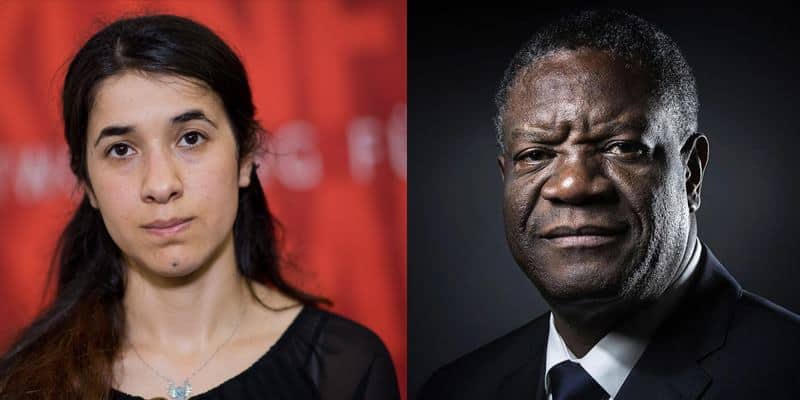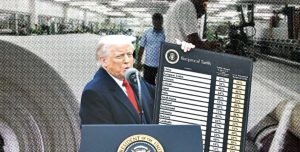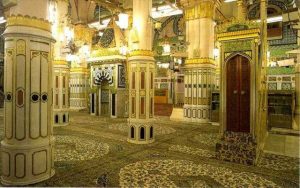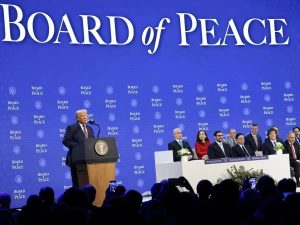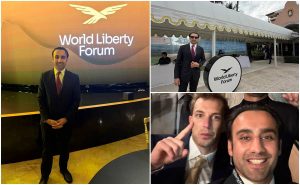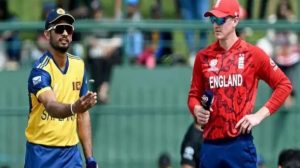OSLO – The Norwegian Nobel Committee has awarded the 2018 Nobel Peace Prize to physician Denis Mukwege and human rights activist Nadia Murad.
The Nobel committee received 216 individuals and 115 organizations’ nominations from around the globe. The committee keeps the list of nominations secret for 50 years, although some candidates are revealed by their nominators.
https://twitter.com/NobelPrize/status/1048135860607221760
Mukwege and Murad won the award for their efforts to end the use of sexual violence as a weapon of war, said committee chairwoman Berit Reiss-Andersen, speaking at a ceremony at the Norwegian Nobel Institute in Oslo.
https://twitter.com/NobelPrize/status/1048139242881392640
Nadia Murad
Nadia Murad,25, is a Yazidi-Kurdish human rights activist was captured by ISIS militants in 2014 and among those 3,000 Yazidi girls and women who were victims of rape and other abuses by the terror group.
Murad eventually escaped to Mosul where a Muslim family helped her obtain fake Islamic identification that enabled her to escape ISIS territory.
In 2016, at the age of just 23, she was named the UN’s first Goodwill Ambassador for the Dignity of Survivors of Human Trafficking.
In November 2017, Murad published her story in The Last Girl: My Story of Captivity, and My Fight Against the militant group.
Denis Mukwege
Denis Mukwege,63, a congolese doctor who has spent his life working with victims of sexual violence in The Democratic Republic of the Congo.
Mukwege has spent large parts of his adult life helping the victims of sexual violence in the Democratic Republic of Congo. Dr. Mukwege and his staff have treated thousands of patients who have fallen victim to such assaults.
The prize will be presented in Oslo on Dec. 10, the anniversary of the death of Swedish industrialist Alfred Nobel, who founded the awards in his 1895 will.
https://en.dailypakistan.com.pk/world/nobel-prize-for-peace-2017-awarded-to-international-campaign-to-abolish-nuclear-weapons/
Last year’s winner was the International Campaign to Abolish Nuclear Weapons (ICAN) who drew world’s attention to the catastrophic humanitarian consequences of any use of nuclear weapons and for its ground-breaking efforts to achieve a treaty-based prohibition of such weapons.
Complete List of Nobel Peace Prize laureates
Here is the full list of Nobel Peace Prize laureates from 1901, when the prize was first awarded. Last year, the prize went to nuclear disarmament group ICAN.
2017: International Campaign to Abolish Nuclear Weapons (ICAN)
2016: Juan Manuel Santos (Colombia)
2015: The National Dialogue Quartet (Tunisia)
2014: Kailash Satyarthi (India) and Malala Yousafzai (Pakistan)
2013: The Organisation for the Prohibition of Chemical Weapons (OPCW)
2012: The European Union (EU)
2011: Ellen Johnson Sirleaf and Leymah Gbowee (Liberia), Tawakkul Karman (Yemen)
2010: Liu Xiaobo (China)
2009: Barack Obama (US)
2008: Martti Ahtisaari (Finland)
2007: Al Gore (US) and the UN Intergovernmental Panel on Climate Change
2006: Muhammad Yunus (Bangladesh) and the Grameen Bank
2005: International Atomic Energy Agency and Mohamed ElBaradei (Egypt)
2004: Wangari Maathai (Kenya)
2003: Shirin Ebadi (Iran)
2002: Jimmy Carter (US)
2001: Kofi Annan (Ghana) and the United Nations
2000: Kim Dae-jung (South Korea)
1999: Medecins Sans Frontieres (Doctors Without Borders)
1998: John Hume and David Trimble (Northern Ireland)
1997: Jody Williams (US) and the International Campaign to Ban Landmines
1996: Carlos Filipe Ximenes Belo and Jose Ramos-Horta (East Timor)
1995: Joseph Rotblat (Britain) and the Pugwash movement
1994: Yitzhak Rabin, Shimon Peres (Israel) and Yasser Arafat (PLO)
1993: Nelson Mandela and Frederik de Klerk (South Africa)
1992: Rigoberta Menchu (Guatemala)
1991: Aung San Suu Kyi (Burma)
1990: Mikhail Gorbachev (Soviet Union)
1989: Dalai Lama (Tibet)
1988: United Nations Peacekeeping Forces
1987: Oscar Arias Sanchez (Costa Rica)
1986: Elie Wiesel (US)
1985: International Physicians for the Prevention of Nuclear War
1984: Desmond Tutu (South Africa)
1983: Lech Walesa (Poland)
1982: Alva Myrdal (Sweden) and Alfonso Garcia Robles (Mexico)
1981: Office of the United Nations High Commissioner for Refugees
1980: Adolfo Perez Esquivel (Argentina)
1979: Mother Teresa (Albania)
1978: Anwar Sadat (Egypt) and Menachem Begin (Israel)
1977: Amnesty International
1976: Betty Williams (Britain) and Mairead Corrigan (Northern Ireland)
1975: Andrei Sakharov (Soviet Union)
1974: Sean MacBride (Ireland) and Eisaku Sato (Japan)
1973: Henry Kissinger (US) and Le Duc Tho (Vietnam, declined)
1972: prize not handed out
1971: Willy Brandt (Germany)
1970: Norman Borlaug (US)
1969: International Labour Organisation
1968: Rene Cassin (France)
1967: prize not handed out
1966: prize not handed out
1965: United Nations Children’s Fund (UNICEF)
1964: Martin Luther King Jr (US)
1963: International Committee of the Red Cross and the League of Red Cross Societies
1962: Linus Carl Pauling (US)
1961: Dag Hammarskjoeld (Sweden)
1960: Albert Lutuli (South Africa)
1959: Philip Noel-Baker (Britain)
1958: Georges Pire (Belgium)
1957: Lester Pearson (Canada)
1956: prize not handed out
1955: prize not handed out
1954: Office of the United Nations High Commissioner for Refugees
1953: George Marshall (US)
1952: Albert Schweitzer (France)
1951: Leon Jouhaux (France)
1950: Ralph Bunche (US)
1949: Lord (John) Boyd Orr of Brechin (Britain)
1948: prize not handed out
1947: Friends Service Council (The Quakers), American Friends Service Committee (The Quakers)
1946: Emily Greene Balch (US), John Raleigh Mott (US)
1945: Cordell Hull (US)
1944: International Committee of the Red Cross
1943: prize not handed out
1942: prize not handed out
1941: prize not handed out
1940: prize not handed out
1939: prize not handed out
1938: Nansen International Office for Refugees
1937: Viscount Cecil of Chelwood (Britain)
1936: Carlos Saavedra Lamas (Argentina)
1935: Carl von Ossietzky (Germany)
1934: Arthur Henderson (Britain)
1933: Sir Norman Angell (Ralph Lane) (Britain)
1932: prize not handed out
1931: Jane Addams (US) and Nicholas Murray Butler (US)
1930: Nathan Soederblom (Sweden)
1929: Frank Billings Kellogg (US)
1928: prize not handed out
1927: Ferdinand Buisson (France) and Ludwig Quidde (Germany)
1926: Aristide Briand (France) and Gustav Stresemann (Germany)
1925: Sir Austen Chamberlain (Britain) and Charles Gates Dawes (US)
1924: prize not handed out
1923: prize not handed out
1922: Fridtjof Nansen (Norway)
1921: Karl Hjalmar Branting (Sweden) and Christian Lous Lange (Norway)
1920: Leon Victor Auguste Bourgeois (France)
1919: Thomas Woodrow Wilson (US)
1918: prize not handed out
1917: International Committee of the Red Cross
1916: prize not handed out
1915: prize not handed out
1914: prize not handed out
1913: Henri La Fontaine (Belgium)
1912: Elihu Root (US)
1911: Tobias Michael Carel Asser (The Netherlands) and Alfred Hermann Fried (Austria)
1910: Permanent International Peace Bureau
1909: Auguste Marie Francois Beernaert (Belgium) and Paul Henri Benjamin Balluet, Baron d’Estournelles de Constant de Rebecque (France)
1908: Klas Pontus Arnoldson (Sweden) and Fredrik Bajer (Denmark)
1907: Ernesto Teodoro Moneta (Italy) and Louis Renault (France)
1906: Theodore Roosevelt (US)
1905: Baroness Bertha Sophie Felicita von Suttner (Austria)
1904: Institute of International Law
1903: William Randal Cremer (Britain)
1902: Elie Ducommun (Switzerland) and Charles Albert Gobat (Switzerland)
1901: Jean Henri Dunant (Switzerland) and Frederic Passy (France)
The annual Nobel Peace Prize is given by the committee in Oslo to the individual or group who has done the most to advance the cause of world peace.

